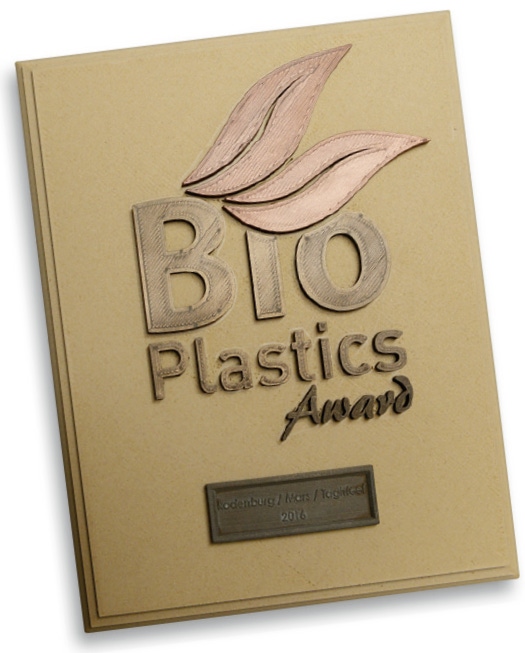When victory is sweet: new Snickers wrapper takes home Global Bioplastics Award 2016
Called the bioplastics "Oskar" by its creator, Michael Thielen, the 3D printed trophy was nabbed by a collaborative project between three companies this year: Mars, Rodenburg and Taghleef.
November 30, 2016

 The annual two-day European Bioplastics Conference kicked off today, 29 November, in Berlin for the eleventh time, with presentations from a broad range of stakeholders - policymakers, scientists, brand owners, industry representatives - from across the globe. From an impassioned plea for an enabling regulatory framework for biobased materials to the development of a novel biobased materials platform, the topics were addressed were as varied as the speakers themselves.
The annual two-day European Bioplastics Conference kicked off today, 29 November, in Berlin for the eleventh time, with presentations from a broad range of stakeholders - policymakers, scientists, brand owners, industry representatives - from across the globe. From an impassioned plea for an enabling regulatory framework for biobased materials to the development of a novel biobased materials platform, the topics were addressed were as varied as the speakers themselves.
The day ended with two important events: the launch of the EN 16785-1 certification scheme developed by NEN, the Netherlands Standardization Institute and the traditional presentation of the annual Global Bioplastics Award, this year for the 11th time. The prestigious Global Bioplastics Award recognizes innovation and excellence in the development of bioplastics products, services and processes. The new EN 16785 standard on biobased content offers a standardized methodology to determine biobased content using V14 carbon analysis and elemental analysis. At the launch of the new certification scheme today, the first two certificates were issued to two companies, to the pine-based chemical producer Arizona Chemical, which was recently acquired by Kraton, and to Corbion.
Michael Thielen, of bioplastics MAGAZINE then took the floor to announce the winner of the 2016 bioplastics award competition, who was selected from the five shortlisted finalists announced last month. This year, the jury selected a project on which three companies had collaborated: the new bioplastics wrapper of the Snickers bars. The candy bars, produced by Mars, were packaged in a new wrapper made from bioplastic material provided by the Dutch bioplastics producer Rodenburg which was processed into film by Dubai-headquartered Taghleef, one of the largest manufacturers of bi-axially oriented polypropylene (BoPP)- and cast polypropylene (CPP) films in the world
An unlikely combination? Not really: when Mars Chocolate Europe and Eurasia decided it wanted a more sustainable packaging for its candy bars, the company could not find what it was looking for in the market. The Dutch Mars production site approached Rodenburg, who had been producing a starch-based bioplastic called Solanyl at commercial scale since 2002, for help. The project kicked off in 2012, but it took another four years to develop the right starch compound, run packaging production trials, and conduct consumer feedback research.
The compound is mainly based on starch derived from potato cutting waste – an industrial waste stream and second-generation biomass that in no way competes with food crops -
and some PLA. Taghleef manufactured the film on an existing BOPP, while Mondi printed the packaging, but it took four production trials before an acceptable packaging film was manufactured.
Calling it a co-creation effort that developed into a “cool product“, Thielen presented the 3D- printed trophy produced from wood-filled, brass-filled and copper-filled biobased specialty filaments provided by Venlo-based colorFABB, to the winners.
“We were surprised to be nominated, and now we are surprised that we won,” said Thijs Rodenburg on accepting the prize. “But I think what’s important is that a big brand stood up and used bioplastics. That is perfect.”
He added: “It’s a big step forward.”
About the Author(s)
You May Also Like


